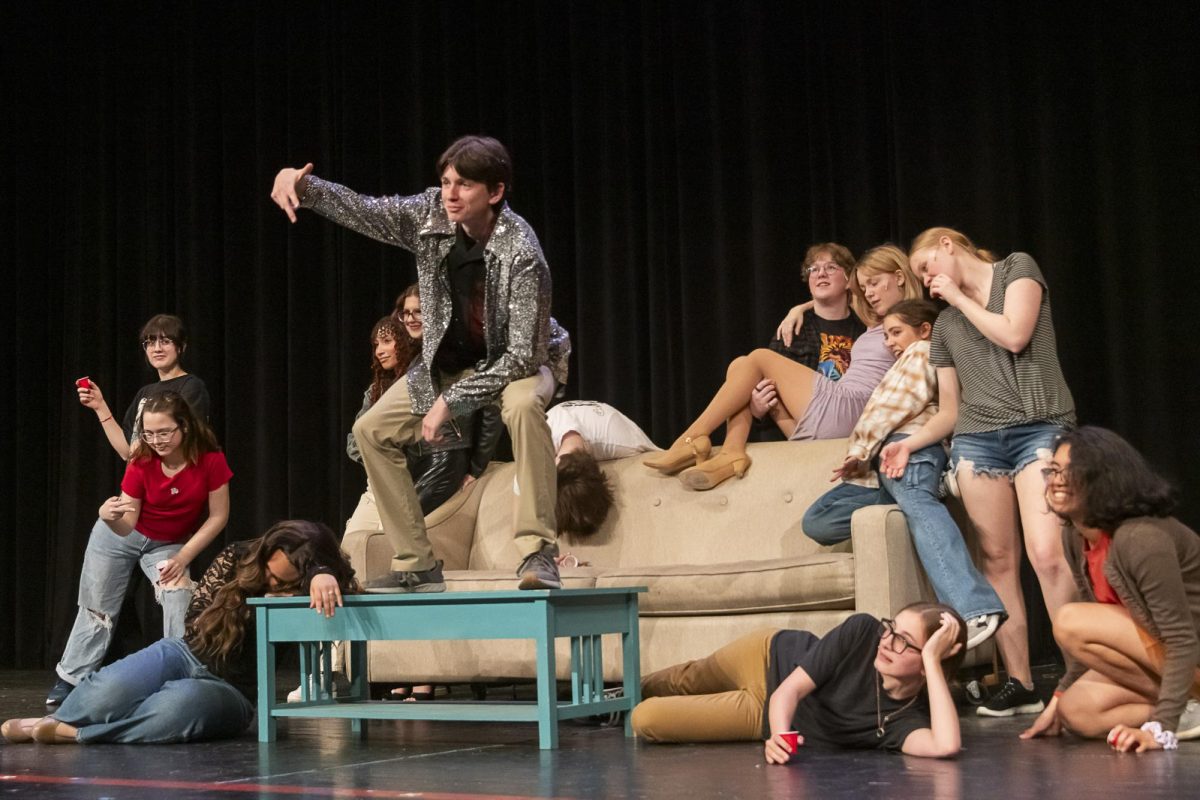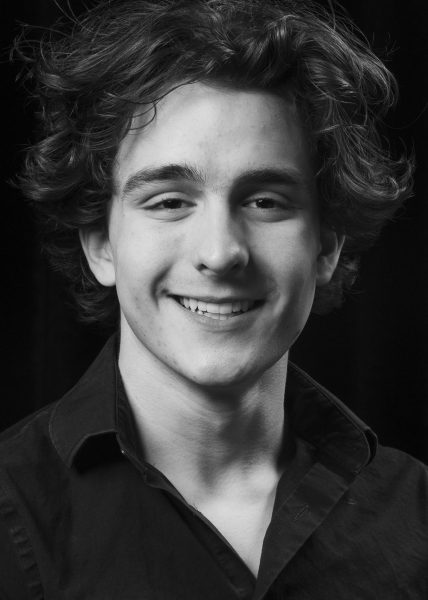The drama program at Waterford High School has undergone a transformation. Previously known as WATERFORDrama, the new Roundtable Theatre has taken the stage with its first performance of The Heidi Chronicles on Thursday, November 21st. The performance went off without a hitch, with a unique “thrust” style seating, where the audience members are seated on stage.
The Heidi Chronicles is a beautiful story about Heidi and her friends living through the boomer generation: the ‘60s, ‘70s, and the ‘80s. This play is a period piece, with many references and political jokes of the times, which granted an opportunity for the cast and audience to learn about what life was like growing up in the tumultuous late 20th century. The small cast of 13 members, including myself, enjoyed their time on stage immensely.
But why do we do it?
In the musical A Man of No Importance, a group of amateur theatre artists work together to put on a show. In the song “Art,” they sing, “There is nothing that you will not do, to feel what it makes you feel,” which I think embodies the essence of why we do what we do—why we perform. There is no other feeling than the energy of a crowd. And we all seek out a different source. For some, it’s playing an instrument or competing in a science bowl, and for others it’s playing football on a Friday night.
Junior AK Wilson, football player and jazz trombonist, says “I’m able to tune the world out when I’m on the field under Friday night lights, [we all] feed off the energy from everyone watching the game.” There’s a dual nature of performance, whether on the field or on stage:it’s both intensely personal and communal. Junior Gabe VanOverloop agrees. “You feel a rush of adrenaline from the game and the excitement from playing the sport you love.” VanOverloop plays the bass in the Chamber Orchestra. “The orchestra feels like a team and we get to produce a product that others will enjoy.”
Patrick Barry, director and founder of Roundtable Theatre, compares theatre to football in many ways, but with one marked difference. “In football, you practice a lot, like we do in the theatre. You have to be very committed. But you get to play a game, reflect, watch tape, and make corrections in practice before you play your next game. In theatre, we practice for two months and then play the Super Bowl three nights in a row. It’s a lot of pressure, but it’s exciting.”
Mr. Barry is a graduate of New York University’s Tisch School of the Arts. He is currently the director of the Clark Lane Players and leads the chorus program at the middle school. He strives to focus on educating students, especially regarding the content of the scripts. He is sure to take time to teach about lighting, acting, costumes, and sound design to enrich understanding rather than just executing the production.
I have been a part of the theater program at WHS for all four of my high school years, but I started as the sound guy. My first stage appearance was Mean Girls last year as Aaron, and I played Peter in the recent The Heidi Chronicles. After the closing night of the The Heidi Chronicles, I asked freshman Austin Hedge (who played Young Peter) how he liked performing in the show. He responded instantly saying the response from the audience was like a drug, and “I want more…”
The drama program has fostered many talented people over its years, with back-to-back year members, longtime singers and performers, and also newbies and curious students.
Senior Sofia Fioravanti has always been a performer: she started acting when she was six. She has appeared in multiple productions and always strives for stage time. Whether it be in the theater or singing in her dad’s jazz band, there’s no doubt that Fioravanti loves what she does, and of course the applause. Most recently she appeared as Heidi in The Heidi Chronicles.
Fioravanti expresses how meeting new people reminds her of herself when she was young. “There’s so many different people that come in that can all bond over a common experience. I especially love getting to see younger people and watching them grow. I see myself in them and it reminds me of how much I love performance.”
I, for one, learned more than I could have ever imagined. When producing a show, you are only given a script. No lighting direction, no blocking, no sound design, no costume design: just the script. It is up to interpretation and good direction to produce a quality show. I learned about how to use lighting to tell a story, how tone and word formation changes a conversation, how important vocal projection is, and more importantly, what it was like to live in the times of the show. I gained an immense appreciation for the art.
I can also compare theater to sports. I’ve been taking photos at sporting events for 3 years, and even though I don’t play on the field, I can still feel the energy and even I am fueled by the noise of the crowd. I’ve always loved that feeling, and I found it again from performing on stage. All the parts I’ve gotten, no matter how small, I’ve loved. I get to present that to a crowd with my peers, and they cheer for us. I am always so excited to see what’s next, and what the next audition cycle holds.
Roundtable Theatre holds auditions before the show is picked. This allows the character to be tailored to your abilities, rather than auditioning for a specific role in a specific show. I was skeptical of this at first. I thought it would turn people away because of the commitment. After The Heidi Chronicles was chosen, I was again skeptical because I didn’t know the show, and it wasn’t very popular. Now after the closing of the show, I can confidently say I fell in love with the story, and I had so much fun with my friends producing it. We didn’t have to put on a “big name” show to have fun, learn something, and please an audience. If you can do any show well, I’m certain those three criteria will be met.
During my first show we would rehearse the same scenes over and over, and it became second nature. I was just saying words and they would float across the stage and there’d be no response during a rehearsal. However, on opening night when there were 550 people in the audience, those seemingly inconsequential lines yielded laughter from the audience. That was something I’d never expected, and that moment was when I knew I didn’t want to stop.
It’s moments like these that motivate us to go on stage and perform. Working for hours every week sounds exhausting, and it is, but at the end of the night when you step on stage and hear the applause from the crowd, it’s a feeling that is simply indescribable. Maybe you’ve felt it when you played a sport, competed in cheerleading, or played an instrument, but for the theater, it’s something special. So with all the doubt leading up to the show, the missed lines, the bumpy dance numbers, just remember as they say in A Man of No Importance: “a week and a half from now, this will be art!” I encourage you to try it out, at least just once… you won’t regret it!




Sandy • Dec 13, 2024 at 11:01 pm
Well done, William! So true, whether on a stage or on a field, participants each have their role to contribute to a successful outcome. And there is no better feeling than when the “magic” happens! I hope that you continue making that magic in the future, after high school, for years to come.